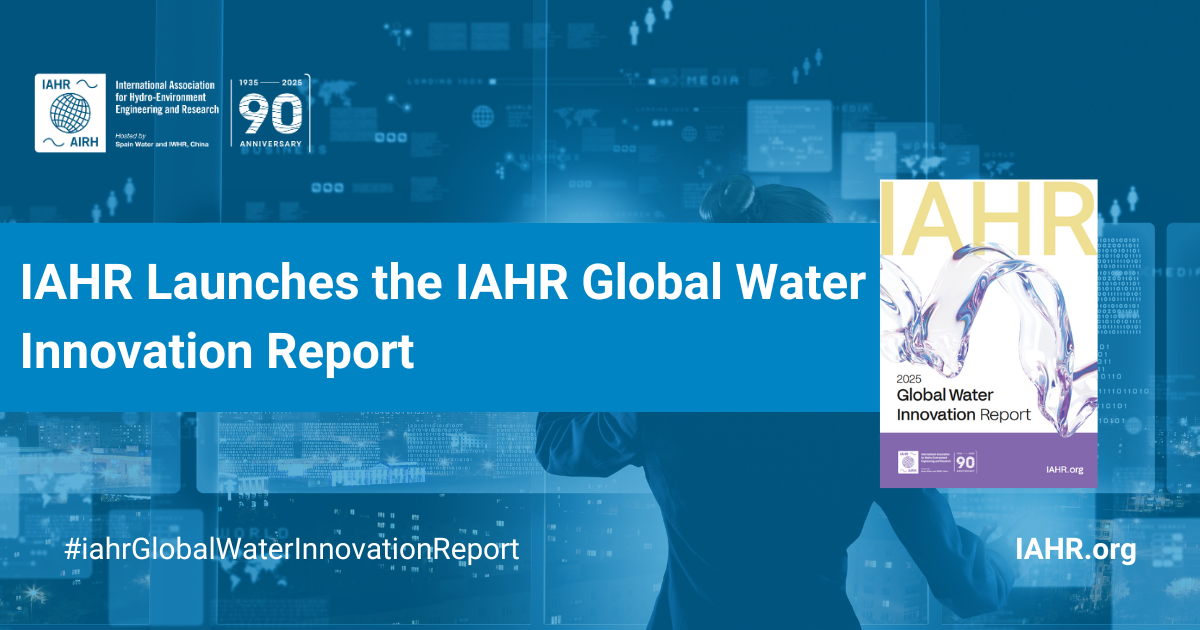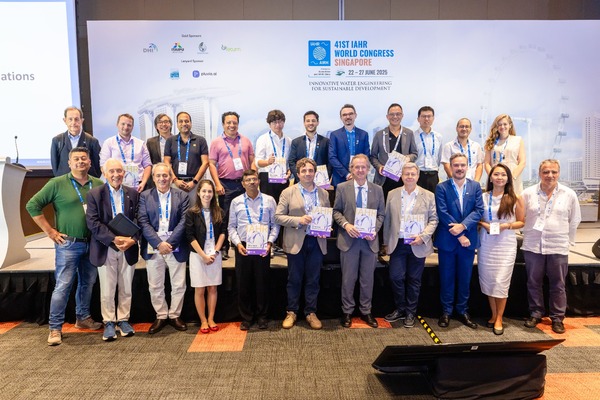IAHR Launches the IAHR Global Water Innovation Report
Innovation is certainly the key engine for the water challenge, but there are so many potential areas for transformative innovation—from climate-resilient infrastructure to smart water management to irrigation efficiency.
And thanks to a new IAHR report, we now know where to focus our attention.
The 2025 IAHR Global Water Innovation Report shares the main priorities for water innovation, as identified by national water associations.
With this direction, we can develop a roadmap to promote and advance the solutions needed, to step up international collaboration, and to amplify the impact of those working in this space.
More than 200,000 water professionals expressed their views through national associations from nine countries. They shared insights on the needs and gaps in water innovation, with numerous professionals identifying similar priorities.
Here are the key results:
The most promising engineering solution or approach for the greatest impact on a social, economic and environmental level:
Top result: Climate-resilient and sustainable infrastructure, including adaptive strategies and nature-based solutions.
The area that requires the most innovation, research & development (R&D) of practical solutions:
Top result: Monitoring, forecasting, and modelling using AI and remote sensing to improve disaster preparedness and real-time management.
The thematic or sectorial area that requires the most attention for developing and broadening fundamental understanding:
Top result: Development of smart water and weather infrastructure and monitoring, through the integration of digital twins, artificial intelligence, and advanced data systems.
Context
The report was officially presented during the first in-person meeting of the IAHR Global Platform of National Water Associations, held on 26 June 2025 in Singapore. This milestone event brought together representatives from national water organisations and was hosted as part of the 41st IAHR World Congress.
This landmark publication consolidates the perspectives of over 200,000 water professionals and national associations from nine countries representing more than three billion people.
This publication marks the first collaborative output of the Platform of National Associations, an initiative launched by IAHR in 2024 to foster international cooperation, knowledge exchange, and joint action among national water professional associations. It involves associations from Brazil, Chile, China, India, Indonesia, Mexico, Peru, Portugal, France, Korea, Spain and Vietnam. Together, these countries represent a population of over three billion people, offering a powerful snapshot of shared and region-specific water challenges and innovation needs.
The report highlights shared innovation priorities, such as climate-resilient infrastructure, smart water management, and AI-driven monitoring, and calls for stronger global cooperation and investment in research and development. The report lays the foundation for a Global Water Innovation Roadmap.
Basic information
Title: IAHR – Global Water Innovation Report
Lead authors: Laura Montano, Philippe Gourbesville, Tom Soo, with contributions from National Water Associations
Keywords: innovation, water issues, IAHR
ISBN: 978-90-835589-2-9 (print version) / 978-90-835589-1-2 (online version)
Year: 2025
Key highlights
Countries identified the development of climate-resilient and sustainable infrastructure as the top innovation priority (‘Emerging game-changer’). This includes adaptive designs and nature-based solutions (NbS) such as green infrastructure, mangrove buffers, flood-resilient urban planning, and upgraded water/sanitation systems. These solutions are considered ready for deployment and crucial for protecting communities from climate-related impacts
The most urgent engineering development need identified is the advancement of real-time monitoring, forecasting, and modelling systems for hydrology, environment, and coastal zones. By integrating AI, remote sensing, and advanced tools, countries aim to improve disaster preparedness (e.g., for floods and droughts), enhance decision-making, and strengthen infrastructure resilience.
The most frequently cited need for basic research is the development of smart water and weather infrastructure, combining digital twins, artificial intelligence, and advanced monitoring systems. These technologies aim to support better water supply reliability, disaster risk reduction, and long-term planning through predictive modelling and real-time analytics.
Strong alignment was also found across countries with IAHR’s Thematic Priority Areas, particularly on:
- Digital transformation: Widespread need for data systems, IoT, AI, and digital tools to modernise water management.
- Climate change adaptation and mitigation: Innovations to help cope with extreme weather events and long-term variability.
- Water-energy-food nexus: Cross-sectoral approaches to improve sustainability and resource efficiency.
- Resilience to water hazards and disasters: Focus on early warning systems, smart infrastructure, and integrated planning.
Open Platform - Join Us
National Water Associations from all countries are invited to participate in the Platform for National Water Associations, to work closely with other water sector organisations around the world to address global priorities and implement solutions aligned with the UN Sustainable Development Goals (SDGs).
For the Asia and Pacific Region, contact Mr. Derek Cai, IAHR Global Secretariat Beijing Office Manager: derek.cai@iahr.org
For Africa, Americas, Europe, contact Ms. Elsa Incio, IAHR Global Secretariat Madrid Office Manager: elsa.incio@iahr.org
Participating countries and associations
Indian Society of Hydraulics | India
Indonesian Association of Hydraulics Engineers | Indonesia
Mexican Hydraulics Association | Mexico
Peru Association of Hydraulic and Environmental Engineering | Peru
Portuguese Water Resources Association | Portugal
Societe Hidrotechnique du France | France
Spanish Institute of Engineers | Spain
Vietnam Academy for Water Resources | Vietnam
Related
IAHR starts a Platform for National Water Associations to bring together National Water Associations for Sustainable Solutions
IAHR Launches the Global Water Innovation Report
On the road to the 42nd IAHR World Congress in Bari! 28 June to 2 July 2027
Calendar of upcoming events

